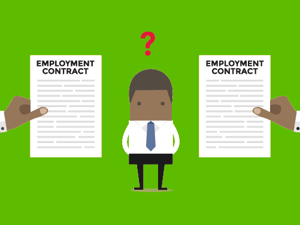So, your candidate has just accepted a job offer and everyone seems happy. With this one firmly in the bag, you decide to focus on filling all the other jobs you have on and set yourself a reminder to check in with the candidate again in a few weeks. But despite everything looking good at this stage, have you considered there’s still a chance they could drop off before start date?
Let’s take a minute to think about why candidates often drop off during their notice period and most importantly – what you as a recruiter can do about it.
Reason 1: The dreaded counter offer
 It really doesn’t matter how confident you are that the candidate wants the job, you’re never safe from counter offers until the candidate walks through the door on start day!
It really doesn’t matter how confident you are that the candidate wants the job, you’re never safe from counter offers until the candidate walks through the door on start day!
Losing a good member of staff is a drain on any business, so it’s likely the candidate’s current employer will do whatever they can to convince your candidate stay where they are – whether this involves putting their money where there mouth is, or offering some sort of skills training or promotion.
How to prevent counter offers:
To prevent counter offers from happening, it's crucial you keep in close contact with the candidate throughout their notice period and make a conscious effort to build a loyal relationship with them.
It’s also a good idea to have a conversation with them to draw attention to the likelihood that they'll receive a counter offer from their current employer and that this is normal practice – no matter how special their boss makes the situation out to be.
And if your candidate comes back to you and tells you they’ve received a counter offer from their employer, flagging the following points could still save the situation:
- Their employer already knows their value - they were just hoping that they didn’t!
- History is likely to repeat itself – the same reasons that pushed them to start looking for a move in the first place are likely to quickly resurface.
- Accepting a counter offer puts their employer back in a position of power - businesses can turn and now that the employer knows the candidate is unhappy, this could cause trust issues and they could find themselves without a job sooner than they think.
Reason 2: Fierce competition for talent
With a skills and talent shortage being a big challenge at the moment, it’s very likely your competitors will still try to swoop in and woo your candidate towards a different opportunity between the time the candidate accepts your job offer and when they actually start the job.
How to beat off the competition:
If you stay close to the candidate, provide an excellent experience and give them a reason to be loyal to you, you’ll have nothing to worry about.
The main key is to listen to the candidate and place them in a role that's right for them – don’t just see them as a number on the board. If the candidate feels the role is a perfect fit, they won’t even return any calls from other recruiters during this time.
Reason 3: Candidate change of heart
If there’s any chance that the candidate could be having doubts about the move – maybe it’s a step up from their current role, or something quite different than what they’re used to – then your support could be needed to pull them over the line and prevent them getting last minute cold feet.
How to stop the candidate from changing their mind:
To prevent them from having a change of heart, try practicing the ‘womb factor’ – be as supportive as you can, encourage them to add their future colleagues on LinkedIn, and provide the candidate with induction material so they can feel better prepared to walk through the door on start date.
If you do all of the above and the candidate still accepts a counter offer – it’s not the end of the world. All this tells you is they weren't invested enough in the opportunity anyway, and moving forward with a risky candidate like this could cost you your retention fee.
For more tips on managing candidate job offers effectively, download the eBook below.
Alan McFadden
Alan is the Associate Director of Growth at Firefish. An agency recruiter in a former life, he loves helping recruiters find ways to recruit smarter.




